By Jillian Viljoen
In collaboration with the Pmb subject
librarians.
All photos taken by Renee Damonse. Thanks
Renee!
South African Library Week (SALW) is celebrated every year in March. It
highlights the valuable role of libraries, librarians and all library staff in
communities. Libraries can have a life changing effect on individuals in
various ways. The theme of SALW this year was “Libraries: telling powerful
stories”.
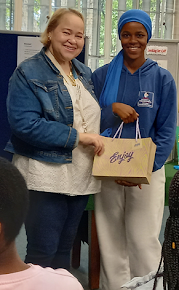 |
| Professor Ruth Hoskins receiving her gift |
When you think of a
story, what comes to mind? An imaginary tale? A recounting of an event
involving certain individuals? Listening to a senior family member reminisce
about past events? Stories can be powerful tools to teach life lessons or to
emphasise or highlight pertinent points.
At the Pmb Library, Professor Ruth Hoskins, the Dean of Teaching and
Learning in the College of Humanities, expanded on the theme by explaining the
history of the UKZN Pmb Library and the value of all library resources. She
gave a brief account of her studies towards becoming a librarian and how that experience
became a foundation for future career choices. An interesting and inspiring
account of events.
 |
Dr Nonhlanhla Ngcobo with the students. Can you identify Dr Nonhlanhla Ngcobo in the crowd? She looks like one of the students. |
Dr Nonhlanhla Ngcobo,
the Director of Library Services, engaged the students on the history of
libraries and encouraged them to provide their views on the challenges of
libraries over the years, the way the digital age has changed the way libraries
provided a service and the role of libraries on the whole. The feedback was
phenomenal. The students displayed a genuine understanding of the role of
libraries and there were positive reviews on the staff and aesthetics inside
the buildings. Thanks to the staff for flying a positive flag high for the
library. Your efforts have paid off and are being noticed.
Professor Mbongeni
Malaba, from the School of Arts, provided an enlightening background on the
establishment of the Centre for African Literary Studies (CALS) on the Pmb
campus, as he was the curator at the centre for eighteen months. This centre
has a valuable collection of literature of African authors. This continent has
a wealth of literature
 |
In the centre:
Professor Mbongeni Malaba
and Mr Wiseman Masango |
and authors and these rare and unique collections have
been sourced by Professor Bernth Lindfors, resulting in the establishment of
CALS. Professor Lindfors is a professor emeritus of English and African
literatures. He is the author of a number of books on African literature and
folklore. He still sends boxes of books and manuscripts which he discovers to
CALS for documenting. Mr Wiseman Masango is the custodian of this special
collection and he highlighted some of the popular authors. He mentioned that
many researchers from the United States and other countries visited the centre
to study the collections which are in many languages. That centre certainly is
a gem at UKZN.
 |
| L-R: Ms Sqedile Mbambo and Ms Noxolo Mthethwa |
Ms Sqedile Mbambo and
Ms Noxolo Mthethwa highlighted the history and varied collections of books
which the UKZN Press publishes. They include different subjects and range from
poetry to novels, to children’s stories, to factual content. What a variety of
publications by this small publishing house. Dynamite really does come in small
packages. Of interest to the postgraduate students was the option of publishing
their completed PhD theses as books. The criteria and processes was explained
to them and their questions indicated that this option was a welcome
alternative for future consideration.

|
| L-R: Ms Edista Ngubane and Ms Slindokuhle Ndlovu |
Ms Mariam Jassat
from the Humanities Student Counselling Support Services, and Ms Edista Ngubane
and Ms Slindokuhle Ndlovu from the Humanities Career Development Office,
reminded students that they are not alone on this academic journey. If they
have any academic, personal or psychological challenges, help is available. The
Student Counselling Support Services are free and qualified psychologists are
on hand to guide you through each challenge. We all need a helping hand once in
a while. There are Career Development Offices in each College. They provide
assistance with creating CV’s, writing covering letters, job interviews,
deciding on a career, assisting you to get part-time and full time employment
and so much more. The staff are there to help you achieve your career goals. What
a wonderful service!
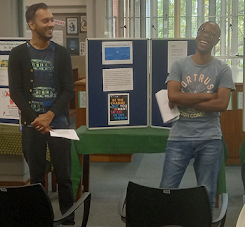 |
L-R: Mr Dhirshan Gobind
and Mr Sphamandla Gwamanda |
Mr
Sphamandla Gwamanda and Mr Dhirshan Gobind, from the Disability Support Unit, outlined
their services for students with various disabilities. They also explained the
processes involved with assisting visually impaired students to get access to
information in a format which they can read. They have various assistive
devices like wheelchairs, etc. For students to get assistance from the
Disability Support Unit, they need to indicate the disability which they have
and what assistance they require. Some students may not want to disclose their
disabilities but there is always the risk of the disabilities hindering their
progress or they may not be adequately accommodated in lectures, pracs, tests
and exams, especially if they require extra time to complete tasks due to their
disabilities. Use this free assistance because it’s specifically designed for
you.
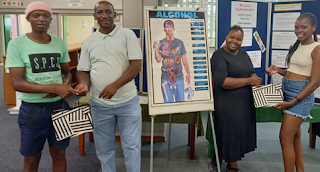 |
On either side of the poster:
Mr Golide Ndlela and his colleague. |
Mr Golide Ndlela from
SANCA (South African National Council on Alcoholism and Drug Dependence) gave
an impactful account of how the abuse of alcohol and drugs has a detrimental
effect on the organs in your body,
especially your brain functions. His visual
aids clearly portrayed the organ damage which we are not aware of when we look
at ourselves on the outside. His detailed explanation of the degeneration and
the fact that the damage cannot be reversed or repaired in most instances was
alarming. This talk was eye opening but also sad because we all either have
loved ones or know people with substance abuse challenges and the reality of
the serious health risks were driven home. Food for thought.
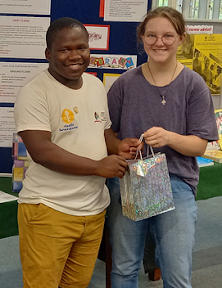 |
| Asathi receiving his gift from a student |
Asathi, from the Golden Key Society, was a last-minute addition to the
programme. He had requested the opportunity to set up a table in the library to
speak to students about the Society after seeing the South African Library Week
programme of speakers advertised on the University Notices. He was given an
opportunity to address the students formally, like the other speakers, and his
session was well attended. Students were delighted to hear about the benefits
of being chosen to be part of this international society and were impressed by
the charity work that they engaged in. Asathi clearly enjoyed what he did and
his enthusiasm was infectious. There certainly was a lot of excitement after
his talk.
 |
| Photos taken in the Research Commons |
 |
| Attendees at the talks |
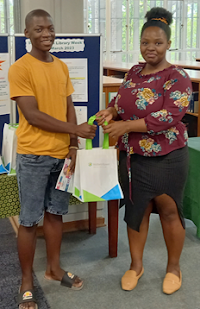 |
On the left:
One of the competition winners. |
Pens were given to
all attendees at each talk. Needless to say, there were many familiar faces by
the end of the week. Guess how many pens they collected. There was a
competition based on the library training sessions. There were 5 lucky prize
winners. With so many entries with correct answers, it was disappointing that
it had to be narrowed down to 5. Everyone was a winner because they learnt
something new.
The interactions and discussions during the talks were lively and
cordial. Students were free to express their opinions, views and to ask
questions. How often are students encouraged to have high-spirited discussions
in the library? This was one time when they weren’t shushed and they made the
most of it.
What an amazing diversity of speakers and interesting discussions! The
library was a platform to highlight various stories. Student engagement was
fruitful. All in all, it was a wonderful celebration of South African Library
Week amidst the online library training sessions. Talk about multi-tasking.










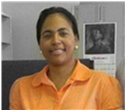


No comments:
Post a Comment